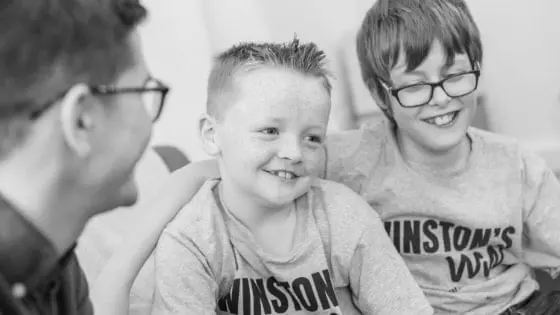This week is Mental Health Awareness Week. The following blog post is an extract from our podcast on the importance of conversation. It features Debbie and Gemma in the South West team. You can listen to the podcast below.
For Parents and Carers
When somebody dies sometimes people just don’t know what to say, so, actually, often people don’t say anything at all. It’s really important to think about; you don’t’ have to have an answer or a solution. It’s ok just to be there to listen and to be there for somebody who might just need to talk.
It’s also important that everybody within the family, particularly for children and young people, has permission to talk so that they know it’s OK. I feel that sometimes children may not want to say something to their parent or carer because they think it might make them worried or upset. Also, adults may worry about getting emotional or upset in front of their child or if that child talks to them, but that’s okay and it’s normal and natural to feel teary or sad when you talk about someone who’s died.
It’s also really good modelling for your child to show them that it’s okay to cry and express your feelings.
For Professionals
When a child or a young person comes to a professional and they want to talk about somebody in their family that has died, professionals will often worry that they will get upset when that child talks to them. That’s actually also okay because it is normal and natural to feel teary when you’re looking after somebody. As a professional, you feel you shouldn’t show your emotions so much but we know from talking to young people that they can get a connection with a teacher or another professional if the person is really just really honest and natural with them.
Some young people have said to us that they sometimes find it easier to talk to somebody who’s not part of their family, or their friendship group. Talking to someone who’s completely neutral gives them the reassurance that there isn’t any right or wrong way; it’s just about being there for the child or young person being able to listen.
Asking Questions
It’s okay to ask questions. It’s okay to ask about the person who died.
You might have an assumption that talking in a certain way or doing an activity about the person who died was right for that child but if you’re not sure, just ask the child what might work for them. Do they want to come and have some quiet time? Do they want to talk or do they want to do something a bit more proactive?
The key thing here is that if you’re not sure, it’s okay to ask the child what they think might work for them.
Talking
Remember, the worst thing has already happened by that important person dying, talking about it won’t make it any worse. It can feel really difficult to talk about something so painful but talking can actually be really helpful.
A worry for many people is that once someone important has died, they think the conversation is always going to be difficult – it’s always going to be emotional. It’s just as important to remember all of the happy times and it’s okay to give yourself permission to laugh, to have fun and also not to talk about it and not to think about it at times as well.
So, for some children, they might really want to bring dad into the conversation all the time and that might feel okay for them and their family. For other young people, particularly maybe teenagers, might sometimes just want to have some time to carry on with other things in their life and to carry on with their normal routines.
We know that routine can be really helpful and important for young people after someone’s died. After time has passed, what some young people have said to us is that people around them might stop mentioning the person who died because everybody’s life carries on.
For the child or young person, it can feel like they’re quite stuck in that at that moment and it’s all-consuming. So they may find it useful to talk about that person.
After the funeral
Young people say sometimes to us that after a funeral they have lots and lots of people – friends and family – around the house all the time for a number of weeks and months. Then, slowly, these people can start retreating back to their normal lives and their normal routines. That could be a really difficult time and that’s when, for a young person, friends become very important to them.
For young people who have a friend that has been bereaved, it can be important to check in with them, just to see how they are. Involving them in normal everyday conversation, like gossip at school or college, so that they have that sense of normality, will hopefully decrease their feeling of isolation because often when you’ve been bereaved it can feel like you’re the only one this has happened to.


